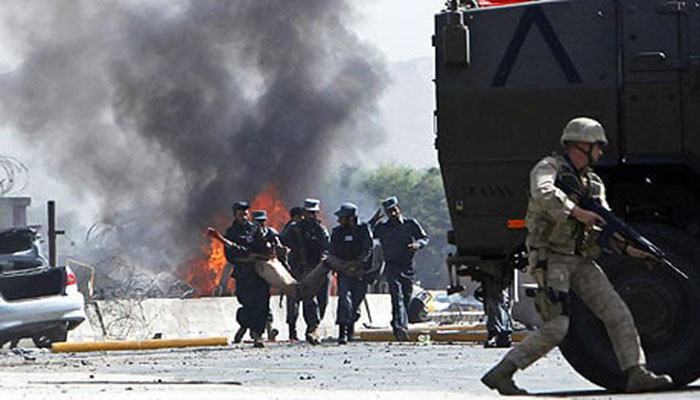28 killed in Kunduz as fighting intensifies
KABUL: Intense fighting in the northern Afghan province of Kunduz killed at least 28 civilians and injured 290 this week, according to hospital officials, as conflict surges in the war-torn nation while foreign forces withdraw.
Ehsanullah Fazli, head of Kunduz's provincial hospital, said 28 bodies and 290 wounded civilians had been delivered to two local hospitals in the past three days, with the vast majority of the casualties included children, women and elderly people. "The war is still going on in the city of Kunduz and the death toll will rise," he said, reported foreign media.
Fighting has worsened around Afghanistan but especially in the north where Taliban have conducted a wave of offensives in recent days, moving beyond their southern strongholds. Afghan President Ashraf Ghani arrived in Washington on Thursday with his former rival and top Afghan peace official Abdullah Abdullah where they were to meet with US President Joe Biden to discuss the US troop withdrawal today. The United Nations envoy for Afghanistan said this week the Taliban had taken more than 50 of 370 districts.
On Thursday, 130 Taliban fighters surrendered with the help of tribal elders in the western province of Herat. "They realised that the Taliban’s war with the Afghan government was illegitimate," Herat Governor Abdul Sabur Qani said at a ceremony to mark the event. Taliban spokesman Zabihullah Mujahid said the 130 men were not from their group, calling the event "propaganda".
Meanwhile, Poland will withdraw its troops from Afghanistan at the end of June, President Andrzej Duda said on Thursday, bringing its two-decade presence in the country to an end.
While, fear stalked Kunduz Thursday as residents prepared for a lengthy siege, with government forces patrolling the streets and Taliban insurgents surrounding the northern Afghan city.
The Taliban have held the city twice in recent years —both times briefly — but have now captured the surrounding districts and the main border crossing with Tajikistan.
Most businesses in Kunduz remained shut and vehicles stayed off the roads. Dozens of military vehicles patrolled the streets as new government forces were deployed in the city of around 300,000, swelled by an influx of rural residents fleeing fighting in the districts. Residents said they were suffering from water and power cuts, and few shops were open.
Meanwhile, US experts say Kabul could be captured by the Taliban within a year as US forces withdraw from Afghanistan, but its fall is not inevitable and will depend on a much better-run Afghan defense force.
As worries mount that the insurgents could retake power in the war-torn country, experts with years of experience in Afghanistan warned that poor leadership, corruption and ethnic divisions in the Afghan security forces offer the Taliban advantages, and that much depends on whether President Ashraf Ghani’s troubled government can hold.
Most of the districts the insurgents have claimed are “out in rural areas of the country that have little strategic or military value. There´s no military need for either actor to be out there.”
Yet some are on transport routes and around provincial capitals. “The Taliban are strengthening their chokeholds around major cities. They’re not necessarily in the near-term future going to try and take those cities,” Watkins said.
James Dobbins, the former US Special Representative for Afghanistan and now an expert at Rand Corporation, said he expects fighting to escalate. Right now, he said, “the Taliban have certain advantages. But their advantages generally apply in the countryside where their supporters are.”
-
 'Mortified' Princess Eugenie, Beatrice Plan Interview To Finally Speak Truth In Sarah Ferguson, Andrew-Epstein Scandal
'Mortified' Princess Eugenie, Beatrice Plan Interview To Finally Speak Truth In Sarah Ferguson, Andrew-Epstein Scandal -
 Lewis Hamilton Spent Years Trying To Catch Kim Kardashian's Attention?
Lewis Hamilton Spent Years Trying To Catch Kim Kardashian's Attention? -
 Royal Strategy Revealed As King Charles, Prince William Issue Statements On Andrew Row
Royal Strategy Revealed As King Charles, Prince William Issue Statements On Andrew Row -
 Inside Will Smith's Struggle To Revive His Career After Infamous Oscar Incident
Inside Will Smith's Struggle To Revive His Career After Infamous Oscar Incident -
 What’s Coming Out Of Meghan Markle’s War Against Prince William? Inside People’s Unease
What’s Coming Out Of Meghan Markle’s War Against Prince William? Inside People’s Unease -
 Australia Seeks Urgent Meeting With Roblox Over 'Disturbing' Content Complaints
Australia Seeks Urgent Meeting With Roblox Over 'Disturbing' Content Complaints -
 Epstein Case: Ghislaine Maxwell Invokes Fifth, Refuses To Testify Before US Congress
Epstein Case: Ghislaine Maxwell Invokes Fifth, Refuses To Testify Before US Congress -
 Ferrari Luce: First Electric Sports Car Unveiled With Enzo V12 Revival
Ferrari Luce: First Electric Sports Car Unveiled With Enzo V12 Revival -
 Chappell Roan Parts Ways With Wasserman Music Over CEO's Ties With Epstein
Chappell Roan Parts Ways With Wasserman Music Over CEO's Ties With Epstein -
 Andrew Mountbatten Windsor Publically Shamed After Brother And Nephew Change Decades Old Royal Rule
Andrew Mountbatten Windsor Publically Shamed After Brother And Nephew Change Decades Old Royal Rule -
 Jon Stewart On Bad Bunny's Super Bowl Performance: 'Killed It''
Jon Stewart On Bad Bunny's Super Bowl Performance: 'Killed It'' -
 Savannah Guthrie Receives Massive Support From Reese Witherspoon, Jennifer Garner After Desperate Plea
Savannah Guthrie Receives Massive Support From Reese Witherspoon, Jennifer Garner After Desperate Plea -
 Celebrities Take Sides As Brooklyn Beckham’s Feud With David, Victoria Heats Up
Celebrities Take Sides As Brooklyn Beckham’s Feud With David, Victoria Heats Up -
 Prince Harry Reacts As Beatrice, Eugenie's Names Surface In Epstein Emails
Prince Harry Reacts As Beatrice, Eugenie's Names Surface In Epstein Emails -
 Cyprus Joins European AI Race: What It Means For Greek LLMs And Regional Innovation
Cyprus Joins European AI Race: What It Means For Greek LLMs And Regional Innovation -
 Amazon Soon To Launch 'AI Content' Marketplace, Says Report
Amazon Soon To Launch 'AI Content' Marketplace, Says Report




